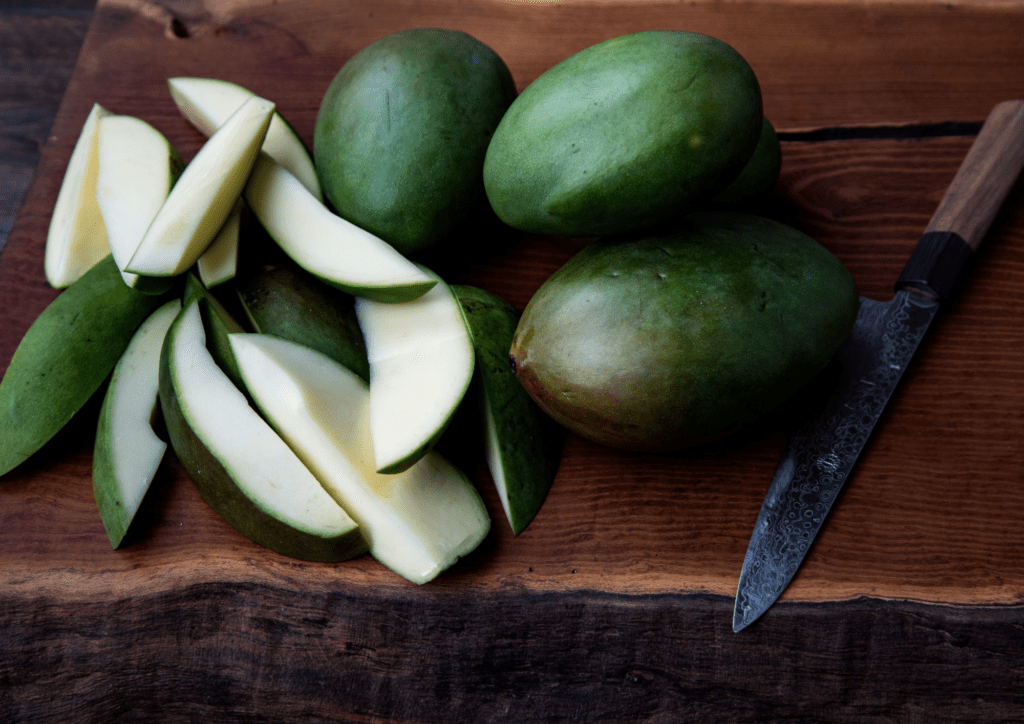Unripened Mango: What It Is, Its Side Effects, and What Happens If You Eat One


Mangoes are delectable fruits enjoyed by millions around the world, known for their sweet, juicy, and tropical flavor. However, not all mangoes are ripe and ready to eat. Unripened mangoes, also known as raw or green mangoes, have a tangy and slightly bitter taste and are commonly used in culinary dishes, pickles, and chutneys. In this blog post, we’ll explore what unripened mango is, its potential side effects, and what can happen if you consume one.
What is Unripened Mango?


Unripened mangoes are mangoes that have not yet reached their full maturity and sweetness. They are usually green in color, firm to the touch, and have a sour taste. As mangoes ripen, their color changes to various shades of yellow, orange, or red, and the flesh becomes softer and sweeter.
READ ALSO: 10 Effects of Carbonated Drinks on the Body
Side Effects of Consuming Unripened Mango:
- Gastrointestinal Distress: Unripened mangoes contain high levels of starch and pectin, which can be difficult to digest for some individuals. Consuming excessive amounts of unripened mangoes may lead to bloating, gas, and abdominal discomfort.
- Mouth and Throat Irritation: The acidity of unripened mangoes can cause irritation to the mouth and throat, particularly for those with sensitive mucous membranes. Eating large quantities of unripe mango may lead to a burning or itching sensation.
- Allergic Reactions: Some people may have allergies to certain components present in unripened mangoes. Common allergic reactions include itching, hives, swelling, and in severe cases, anaphylaxis. If you experience any allergic symptoms after consuming unripened mango, seek medical attention immediately.
- Altered Blood Sugar Levels: Unripened mangoes have a higher starch content compared to ripe mangoes, which can cause a rapid increase in blood sugar levels when consumed in large quantities. People with diabetes or insulin resistance should be cautious about consuming excessive amounts of unripe mango.
- Nutrient Absorption Interference: Unripened mangoes contain compounds known as tannins, which may interfere with the absorption of certain minerals like iron and calcium from other foods. This could potentially lead to nutrient deficiencies over time if unripened mango is a major part of one’s diet.
What Happens If You Eat an Unripened Mango?
Eating a small amount of unripened mango is generally safe for most people. However, consuming large quantities or making it a regular part of your diet may lead to the side effects mentioned above. The severity of the side effects can vary from person to person, and some individuals may be more sensitive to unripened mangoes than others.
If you accidentally eat an unripened mango or experience any discomfort after consumption, the symptoms are usually mild and should subside on their own. Drinking plenty of water and avoiding further consumption of unripe mango can help ease any discomfort.
Precautions and Recommendations
- Moderation is Key: If you enjoy the taste of unripened mango, it’s best to consume it in moderation. Avoid eating large quantities in one sitting.
- Opt for Ripe Mangoes: To fully enjoy the sweetness and nutritional benefits of mangoes, choose ripe ones. Ripe mangoes are not only delicious but also easier on the digestive system.
- Consider Allergies: If you have a known allergy to mangoes or any other related fruits, avoid consuming unripened mangoes altogether.
- Avoid During Pregnancy: Pregnant women are advised to steer clear of unripened mangoes due to the potential gastrointestinal discomfort they may cause.
FAQs on Unripened Mango
What is the difference between ripe mango and unripe mango?
A ripe mango will give slightly. A medium-ripe mango will be somewhat firm, and an unripe mango will be very firm to the touch. Do you know that mangos can be enjoyed at all levels of ripeness? Mango flavor ranges from sour-tart for unripe mangos, to naturally sweet for ripe mangos.
Is unripe mango OK to eat?
YOU may have thought that consuming unripe mangoes could be harmful, but research has shown that eating the fruit in that state is most suitable for improved well-being.
Do unripe mangos have less sugar?
A study published in the Indian-based Rasayan Journal revealed that unripe mango had significantly less water content (23.5%) than ripe ones, which contained 82.9%. But it also has slightly less sugar, more proteins, less fat, and more minerals.
Is unripe mango good for diabetes?
Raw mangoes are rich in their vitamin C content and they also have a high amount of antioxidants. Also, the glycemic load in green mangoes, or raw mangoes, is low to moderate. This is why green mangoes or raw mangoes are considered good to consume, even when you are a diabetic.
Conclusion
Unripened mangoes, while a common ingredient in various dishes and pickles, should be consumed in moderation. The side effects of eating unripened mangoes can range from mild gastrointestinal discomfort to allergic reactions in some individuals. To savor the delightful taste and health benefits of mangoes, opt for fully ripe mangoes, which are easier to digest and offer a delightful sweetness to tantalize your taste buds. Remember, as with any food, it’s essential to listen to your body and consume unripened mangoes responsibly.

